6 Ways to Improve Participant Engagement in Qualitative Research Interviews using AI
6 Ways to Improve Participant Engagement in Qualitative Research Interviews using AI
6 Ways to Improve Participant Engagement in Qualitative Research Interviews using AI



Participant engagement in qualitative interviews plays a pivotal role in the success of market research endeavors by ensuring the depth, authenticity, and relevance of insights gathered. Engaged participants actively contribute their perspectives, experiences, and opinions, thereby enriching the qualitative data with nuanced details and diverse viewpoints. This engagement not only enhances the quality and accuracy of research findings but also increases the efficiency of data collection processes.
It’s important that market research agencies foster a conducive environment where participants feel valued, respected, and encouraged to share openly, researchers can uncover deeper insights into consumer behaviors, preferences, and motivations. Ultimately, high levels of participant engagement contribute to more informed decision-making in marketing strategies, product development, and customer experience enhancements, driving business success and competitive advantage in dynamic market landscapes.
High participant engagement is crucial for the quality and efficiency of qualitative market research in several ways:
Depth of Insights: Engaged participants are more likely to provide detailed, candid responses, offering deeper insights into their behaviors, perceptions, and preferences. This richness in qualitative data enhances the overall quality and validity of research findings.
Data Relevance and Completeness: Actively engaged participants are more likely to address all aspects of the research topic comprehensively, ensuring that no crucial insights or perspectives are overlooked during data collection.
Reduced Bias: Increased engagement mitigates social desirability bias, where participants may provide responses they think are expected rather than genuine. Engaged participants are more likely to offer authentic, unbiased perspectives.
Efficiency in Data Collection: When participants are engaged, interviews tend to flow more smoothly, requiring less effort to prompt responses and probe for deeper insights. This efficiency saves time and resources in conducting qualitative research.
Participant Satisfaction and Retention: Engaged participants are more likely to have a positive experience with the research process, leading to higher satisfaction levels and potentially increasing their willingness to participate in future studies.
Enhanced Research Impact: Insights gathered from engaged participants are more likely to be actionable and relevant to business decisions, ultimately contributing to the effectiveness of marketing strategies, product development, or service improvements.
Overall, participant engagement in qualitative interviews is a cornerstone of effective market research, influencing the depth, accuracy, and usability of qualitative data collected. By fostering engagement through effective communication, interactive methodologies, and respectful rapport-building, researchers maximize the value of qualitative research efforts and derive meaningful insights that drive business success.
How to Improve Participant Engagement in Qualitative Research Interviews
Personalized Interaction:
Tailored Questions: AI adapts questions based on participant responses, ensuring relevance and maintaining engagement by addressing specific participant interests or concerns.
Natural Language Processing (NLP): Use NLP to process responses in real-time, allowing AI to provide relevant follow-up questions or probes, mimicking a natural conversation flow.
Interactive Feedback Mechanisms:
Immediate Responses: AI provides instant feedback or acknowledgment of participant responses, reinforcing active participation and validating their contributions.
Clarification Assistance: Offer immediate clarification on questions or terms that participants may find confusing, ensuring clear understanding and reducing frustration.
Gamification Elements:
Reward Systems: Implement gamification elements such as virtual rewards or points for active participation, encouraging sustained engagement throughout the interview.
Progress Tracking: Display progress indicators or milestones within the interview process, motivating participants to complete the session and providing a sense of accomplishment.
Multimodal Communication:
Voice and Visuals: Combine voice interactions with visual aids or multimedia content (e.g., images, diagrams) through integrated platforms, enhancing engagement and understanding for participants.
Cultural Sensitivity and Adaptability:
Multilingual Support: Offer interviews in multiple languages to cater to diverse participant demographics, ensuring inclusivity and accessibility across global audiences.
Cultural Context: AI is programmed to recognize cultural nuances in responses and adjust interaction styles accordingly, fostering rapport and trust with participants.
Feedback and Collaboration:
Participant Feedback Loop: Solicit feedback from participants on their interview experience using AI-driven surveys or follow-up questions, demonstrating responsiveness to participant input.
Co-creation Opportunities: Engage participants in collaborative activities, such as brainstorming sessions or ideation workshops facilitated by AI, to gather richer qualitative insights and foster a sense of ownership in the research process.
Leverage these strategies as conversational AI voice agents not only enhance participant engagement in qualitative research interviews but also optimize data collection processes, improve research outcomes, and ultimately contribute to more meaningful insights for decision-making in various fields.
In conclusion, AI voice agents like Metaforms represent a transformative tool in qualitative interviews, offering numerous benefits that enhance both the process and outcomes of market research. By leveraging natural language processing and adaptive questioning, AI agents ensure consistent and unbiased data collection while fostering participant engagement through interactive and personalized interactions. Their ability to operate round-the-clock, provide immediate feedback, and support multilingual capabilities expands research accessibility and efficiency. Furthermore, AI-driven data analysis enhances the depth and accuracy of insights, enabling researchers to uncover nuanced consumer behaviors and preferences more effectively. Overall, AI voice agents not only streamline qualitative research processes but also elevate the quality of findings, empowering businesses to make informed decisions that resonate with consumer needs and drive competitive advantage in rapidly evolving markets. Sign-up for a demo with Metaforms.ai today!
Participant engagement in qualitative interviews plays a pivotal role in the success of market research endeavors by ensuring the depth, authenticity, and relevance of insights gathered. Engaged participants actively contribute their perspectives, experiences, and opinions, thereby enriching the qualitative data with nuanced details and diverse viewpoints. This engagement not only enhances the quality and accuracy of research findings but also increases the efficiency of data collection processes.
It’s important that market research agencies foster a conducive environment where participants feel valued, respected, and encouraged to share openly, researchers can uncover deeper insights into consumer behaviors, preferences, and motivations. Ultimately, high levels of participant engagement contribute to more informed decision-making in marketing strategies, product development, and customer experience enhancements, driving business success and competitive advantage in dynamic market landscapes.
High participant engagement is crucial for the quality and efficiency of qualitative market research in several ways:
Depth of Insights: Engaged participants are more likely to provide detailed, candid responses, offering deeper insights into their behaviors, perceptions, and preferences. This richness in qualitative data enhances the overall quality and validity of research findings.
Data Relevance and Completeness: Actively engaged participants are more likely to address all aspects of the research topic comprehensively, ensuring that no crucial insights or perspectives are overlooked during data collection.
Reduced Bias: Increased engagement mitigates social desirability bias, where participants may provide responses they think are expected rather than genuine. Engaged participants are more likely to offer authentic, unbiased perspectives.
Efficiency in Data Collection: When participants are engaged, interviews tend to flow more smoothly, requiring less effort to prompt responses and probe for deeper insights. This efficiency saves time and resources in conducting qualitative research.
Participant Satisfaction and Retention: Engaged participants are more likely to have a positive experience with the research process, leading to higher satisfaction levels and potentially increasing their willingness to participate in future studies.
Enhanced Research Impact: Insights gathered from engaged participants are more likely to be actionable and relevant to business decisions, ultimately contributing to the effectiveness of marketing strategies, product development, or service improvements.
Overall, participant engagement in qualitative interviews is a cornerstone of effective market research, influencing the depth, accuracy, and usability of qualitative data collected. By fostering engagement through effective communication, interactive methodologies, and respectful rapport-building, researchers maximize the value of qualitative research efforts and derive meaningful insights that drive business success.
How to Improve Participant Engagement in Qualitative Research Interviews
Personalized Interaction:
Tailored Questions: AI adapts questions based on participant responses, ensuring relevance and maintaining engagement by addressing specific participant interests or concerns.
Natural Language Processing (NLP): Use NLP to process responses in real-time, allowing AI to provide relevant follow-up questions or probes, mimicking a natural conversation flow.
Interactive Feedback Mechanisms:
Immediate Responses: AI provides instant feedback or acknowledgment of participant responses, reinforcing active participation and validating their contributions.
Clarification Assistance: Offer immediate clarification on questions or terms that participants may find confusing, ensuring clear understanding and reducing frustration.
Gamification Elements:
Reward Systems: Implement gamification elements such as virtual rewards or points for active participation, encouraging sustained engagement throughout the interview.
Progress Tracking: Display progress indicators or milestones within the interview process, motivating participants to complete the session and providing a sense of accomplishment.
Multimodal Communication:
Voice and Visuals: Combine voice interactions with visual aids or multimedia content (e.g., images, diagrams) through integrated platforms, enhancing engagement and understanding for participants.
Cultural Sensitivity and Adaptability:
Multilingual Support: Offer interviews in multiple languages to cater to diverse participant demographics, ensuring inclusivity and accessibility across global audiences.
Cultural Context: AI is programmed to recognize cultural nuances in responses and adjust interaction styles accordingly, fostering rapport and trust with participants.
Feedback and Collaboration:
Participant Feedback Loop: Solicit feedback from participants on their interview experience using AI-driven surveys or follow-up questions, demonstrating responsiveness to participant input.
Co-creation Opportunities: Engage participants in collaborative activities, such as brainstorming sessions or ideation workshops facilitated by AI, to gather richer qualitative insights and foster a sense of ownership in the research process.
Leverage these strategies as conversational AI voice agents not only enhance participant engagement in qualitative research interviews but also optimize data collection processes, improve research outcomes, and ultimately contribute to more meaningful insights for decision-making in various fields.
In conclusion, AI voice agents like Metaforms represent a transformative tool in qualitative interviews, offering numerous benefits that enhance both the process and outcomes of market research. By leveraging natural language processing and adaptive questioning, AI agents ensure consistent and unbiased data collection while fostering participant engagement through interactive and personalized interactions. Their ability to operate round-the-clock, provide immediate feedback, and support multilingual capabilities expands research accessibility and efficiency. Furthermore, AI-driven data analysis enhances the depth and accuracy of insights, enabling researchers to uncover nuanced consumer behaviors and preferences more effectively. Overall, AI voice agents not only streamline qualitative research processes but also elevate the quality of findings, empowering businesses to make informed decisions that resonate with consumer needs and drive competitive advantage in rapidly evolving markets. Sign-up for a demo with Metaforms.ai today!
Participant engagement in qualitative interviews plays a pivotal role in the success of market research endeavors by ensuring the depth, authenticity, and relevance of insights gathered. Engaged participants actively contribute their perspectives, experiences, and opinions, thereby enriching the qualitative data with nuanced details and diverse viewpoints. This engagement not only enhances the quality and accuracy of research findings but also increases the efficiency of data collection processes.
It’s important that market research agencies foster a conducive environment where participants feel valued, respected, and encouraged to share openly, researchers can uncover deeper insights into consumer behaviors, preferences, and motivations. Ultimately, high levels of participant engagement contribute to more informed decision-making in marketing strategies, product development, and customer experience enhancements, driving business success and competitive advantage in dynamic market landscapes.
High participant engagement is crucial for the quality and efficiency of qualitative market research in several ways:
Depth of Insights: Engaged participants are more likely to provide detailed, candid responses, offering deeper insights into their behaviors, perceptions, and preferences. This richness in qualitative data enhances the overall quality and validity of research findings.
Data Relevance and Completeness: Actively engaged participants are more likely to address all aspects of the research topic comprehensively, ensuring that no crucial insights or perspectives are overlooked during data collection.
Reduced Bias: Increased engagement mitigates social desirability bias, where participants may provide responses they think are expected rather than genuine. Engaged participants are more likely to offer authentic, unbiased perspectives.
Efficiency in Data Collection: When participants are engaged, interviews tend to flow more smoothly, requiring less effort to prompt responses and probe for deeper insights. This efficiency saves time and resources in conducting qualitative research.
Participant Satisfaction and Retention: Engaged participants are more likely to have a positive experience with the research process, leading to higher satisfaction levels and potentially increasing their willingness to participate in future studies.
Enhanced Research Impact: Insights gathered from engaged participants are more likely to be actionable and relevant to business decisions, ultimately contributing to the effectiveness of marketing strategies, product development, or service improvements.
Overall, participant engagement in qualitative interviews is a cornerstone of effective market research, influencing the depth, accuracy, and usability of qualitative data collected. By fostering engagement through effective communication, interactive methodologies, and respectful rapport-building, researchers maximize the value of qualitative research efforts and derive meaningful insights that drive business success.
How to Improve Participant Engagement in Qualitative Research Interviews
Personalized Interaction:
Tailored Questions: AI adapts questions based on participant responses, ensuring relevance and maintaining engagement by addressing specific participant interests or concerns.
Natural Language Processing (NLP): Use NLP to process responses in real-time, allowing AI to provide relevant follow-up questions or probes, mimicking a natural conversation flow.
Interactive Feedback Mechanisms:
Immediate Responses: AI provides instant feedback or acknowledgment of participant responses, reinforcing active participation and validating their contributions.
Clarification Assistance: Offer immediate clarification on questions or terms that participants may find confusing, ensuring clear understanding and reducing frustration.
Gamification Elements:
Reward Systems: Implement gamification elements such as virtual rewards or points for active participation, encouraging sustained engagement throughout the interview.
Progress Tracking: Display progress indicators or milestones within the interview process, motivating participants to complete the session and providing a sense of accomplishment.
Multimodal Communication:
Voice and Visuals: Combine voice interactions with visual aids or multimedia content (e.g., images, diagrams) through integrated platforms, enhancing engagement and understanding for participants.
Cultural Sensitivity and Adaptability:
Multilingual Support: Offer interviews in multiple languages to cater to diverse participant demographics, ensuring inclusivity and accessibility across global audiences.
Cultural Context: AI is programmed to recognize cultural nuances in responses and adjust interaction styles accordingly, fostering rapport and trust with participants.
Feedback and Collaboration:
Participant Feedback Loop: Solicit feedback from participants on their interview experience using AI-driven surveys or follow-up questions, demonstrating responsiveness to participant input.
Co-creation Opportunities: Engage participants in collaborative activities, such as brainstorming sessions or ideation workshops facilitated by AI, to gather richer qualitative insights and foster a sense of ownership in the research process.
Leverage these strategies as conversational AI voice agents not only enhance participant engagement in qualitative research interviews but also optimize data collection processes, improve research outcomes, and ultimately contribute to more meaningful insights for decision-making in various fields.
In conclusion, AI voice agents like Metaforms represent a transformative tool in qualitative interviews, offering numerous benefits that enhance both the process and outcomes of market research. By leveraging natural language processing and adaptive questioning, AI agents ensure consistent and unbiased data collection while fostering participant engagement through interactive and personalized interactions. Their ability to operate round-the-clock, provide immediate feedback, and support multilingual capabilities expands research accessibility and efficiency. Furthermore, AI-driven data analysis enhances the depth and accuracy of insights, enabling researchers to uncover nuanced consumer behaviors and preferences more effectively. Overall, AI voice agents not only streamline qualitative research processes but also elevate the quality of findings, empowering businesses to make informed decisions that resonate with consumer needs and drive competitive advantage in rapidly evolving markets. Sign-up for a demo with Metaforms.ai today!
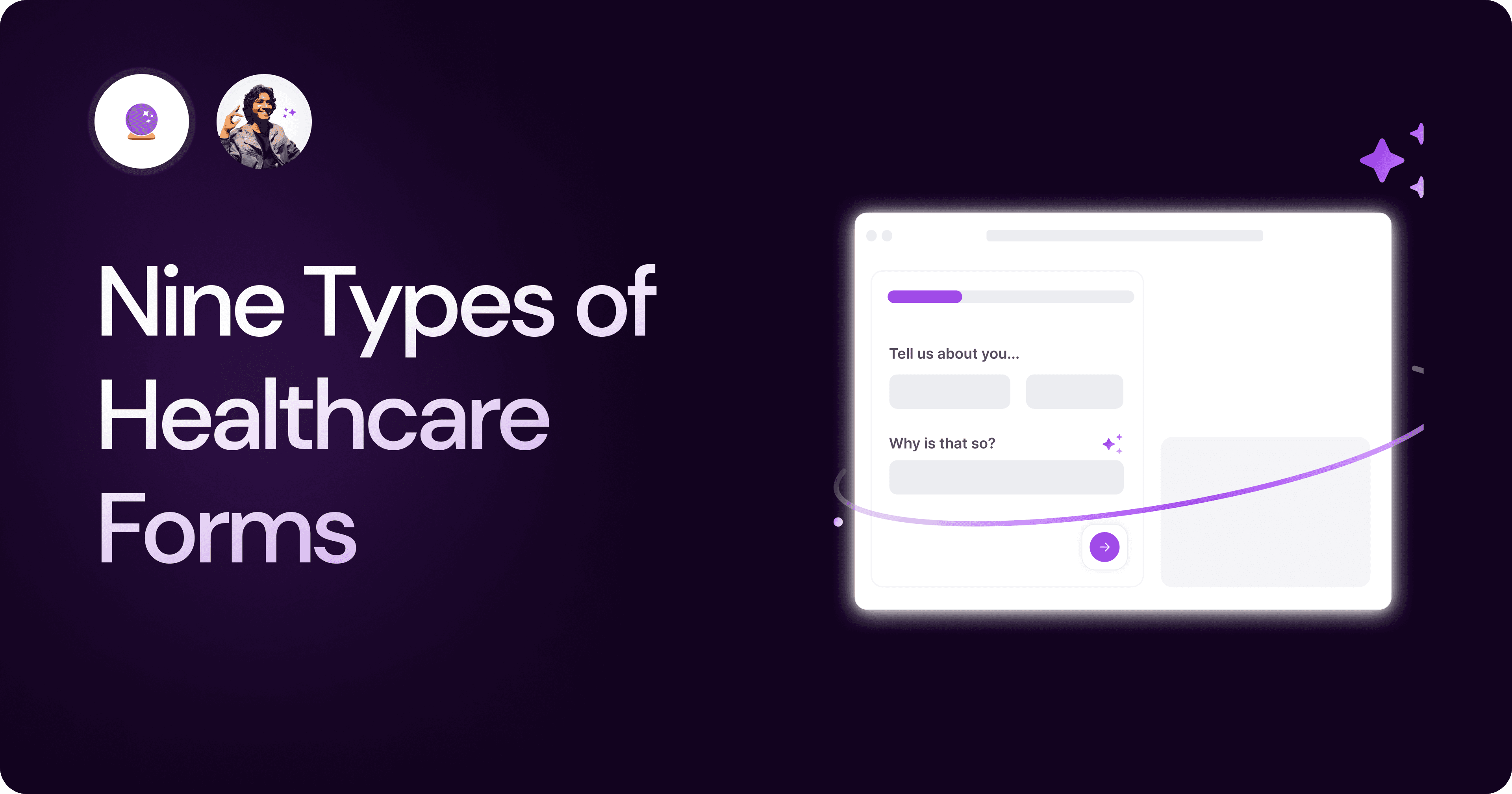
Nine Types of Healthcare and Medical Forms.
Medical forms are a must-have for any healthcare business or practitioner. Learn about the different kinds of medical and healthcare forms.
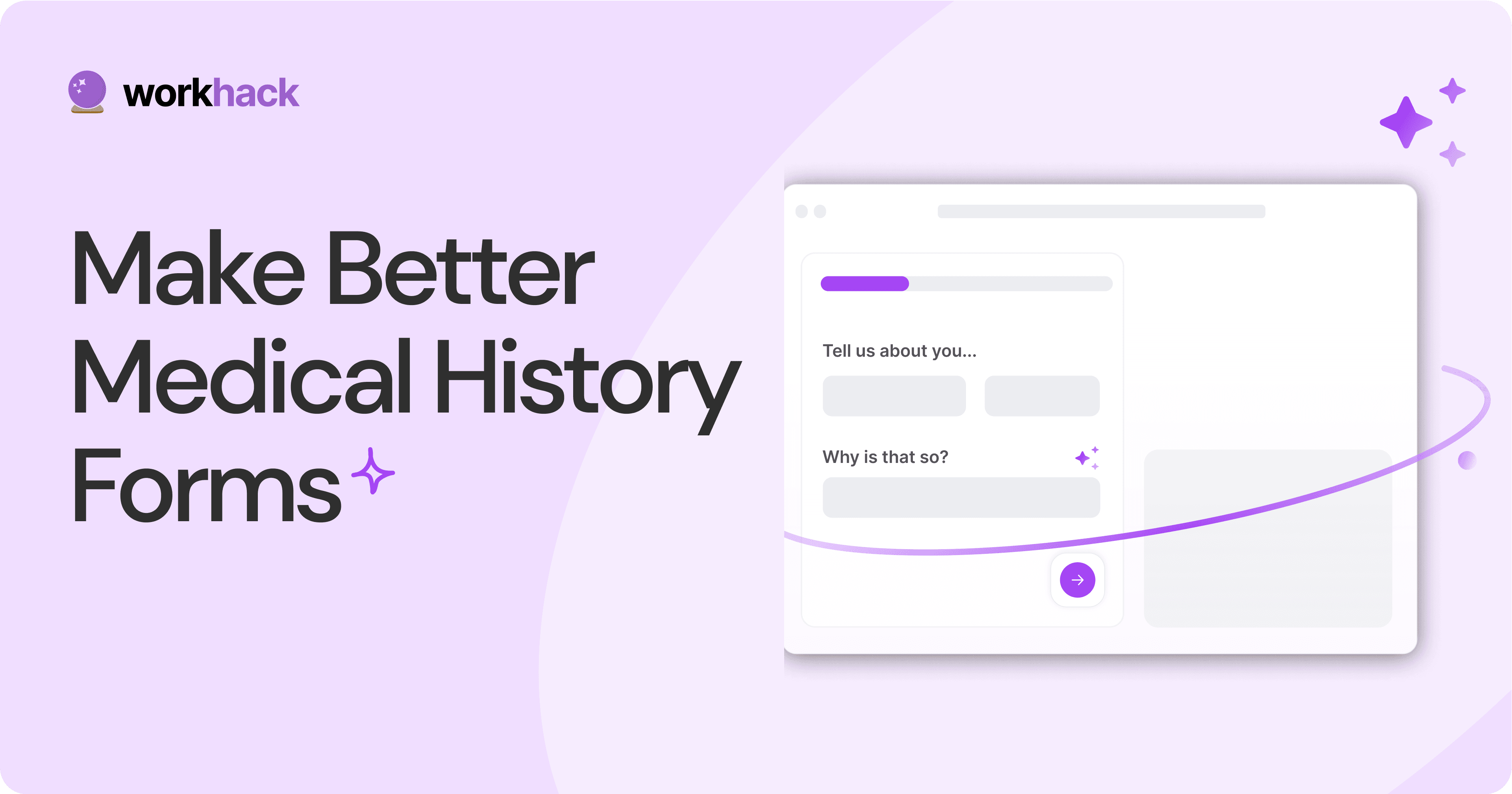
4 Tips for Better Medical History Forms.
Medical history forms are central to patient care, onboarding, and medical administration records. Learn how to make them easier to fill.
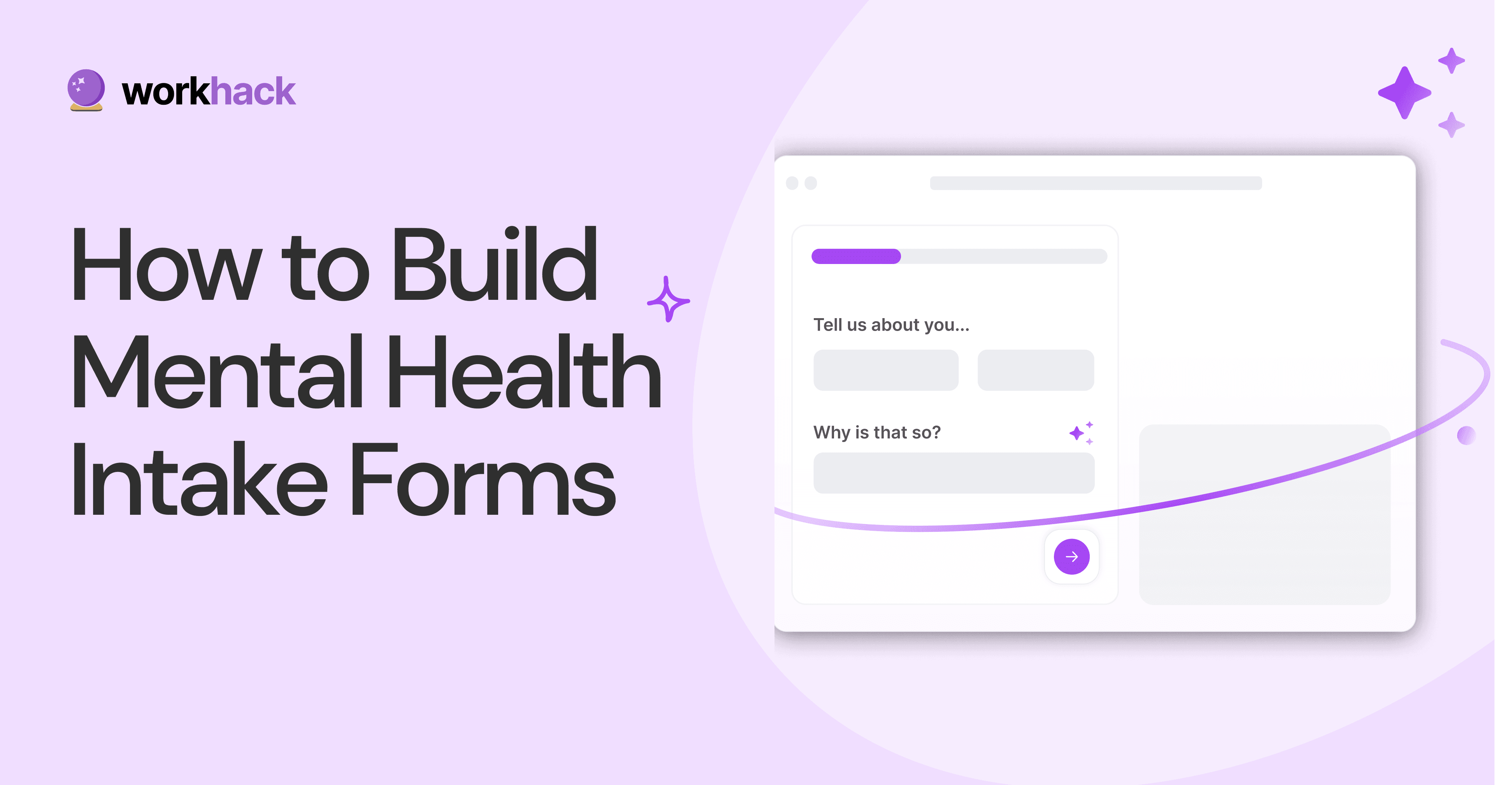
How to Build Mental Health Intake Forms?
Mental health intake forms are not like patient intake forms. Mental health intake forms deal with far more sensitive data and have specific design methods.
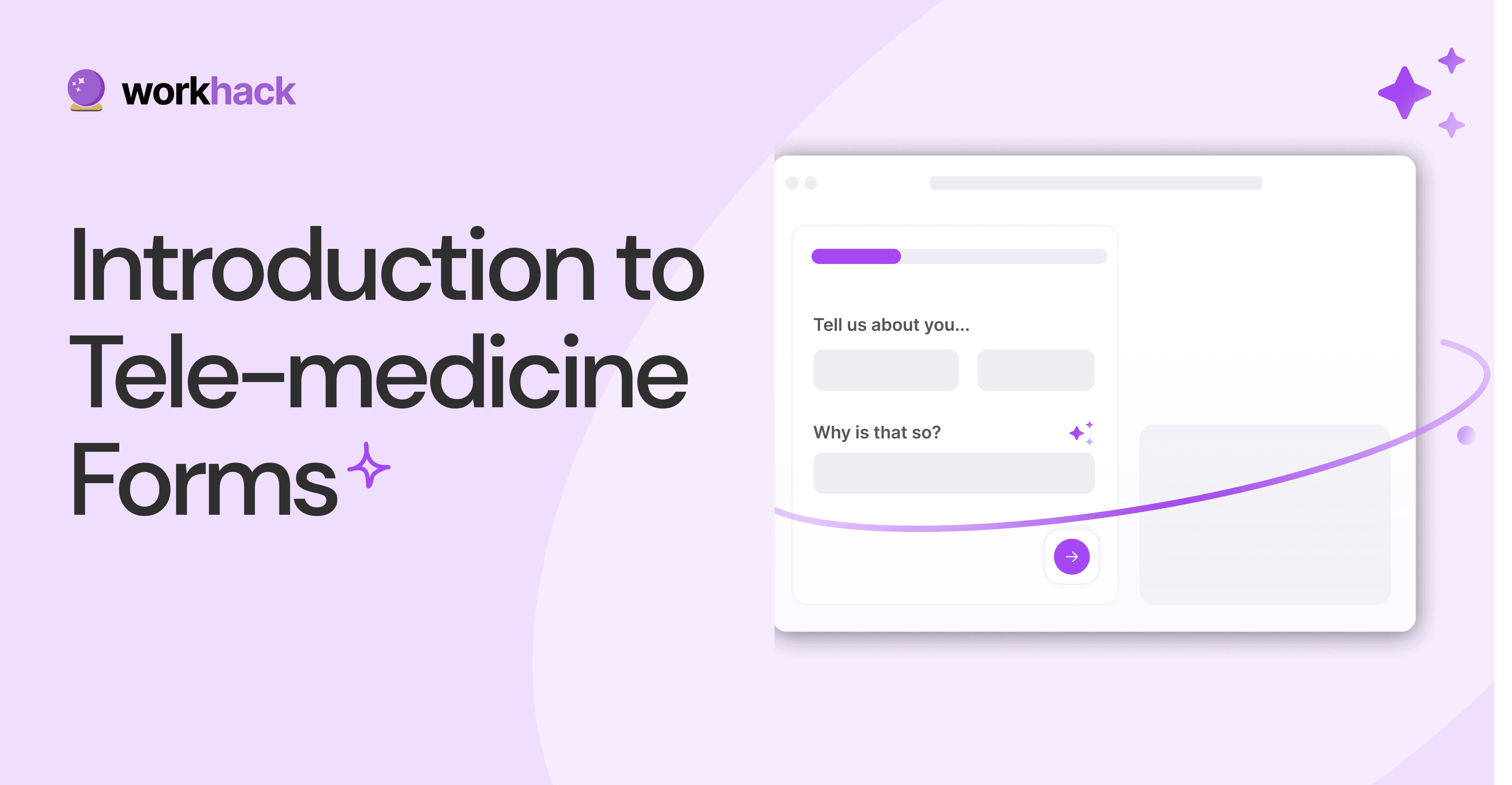
What, Why and How of Telemedicine Forms.
Telemedicine is on the rise and with different form builders out there, which one best suits your needs as a healthcare services provider?
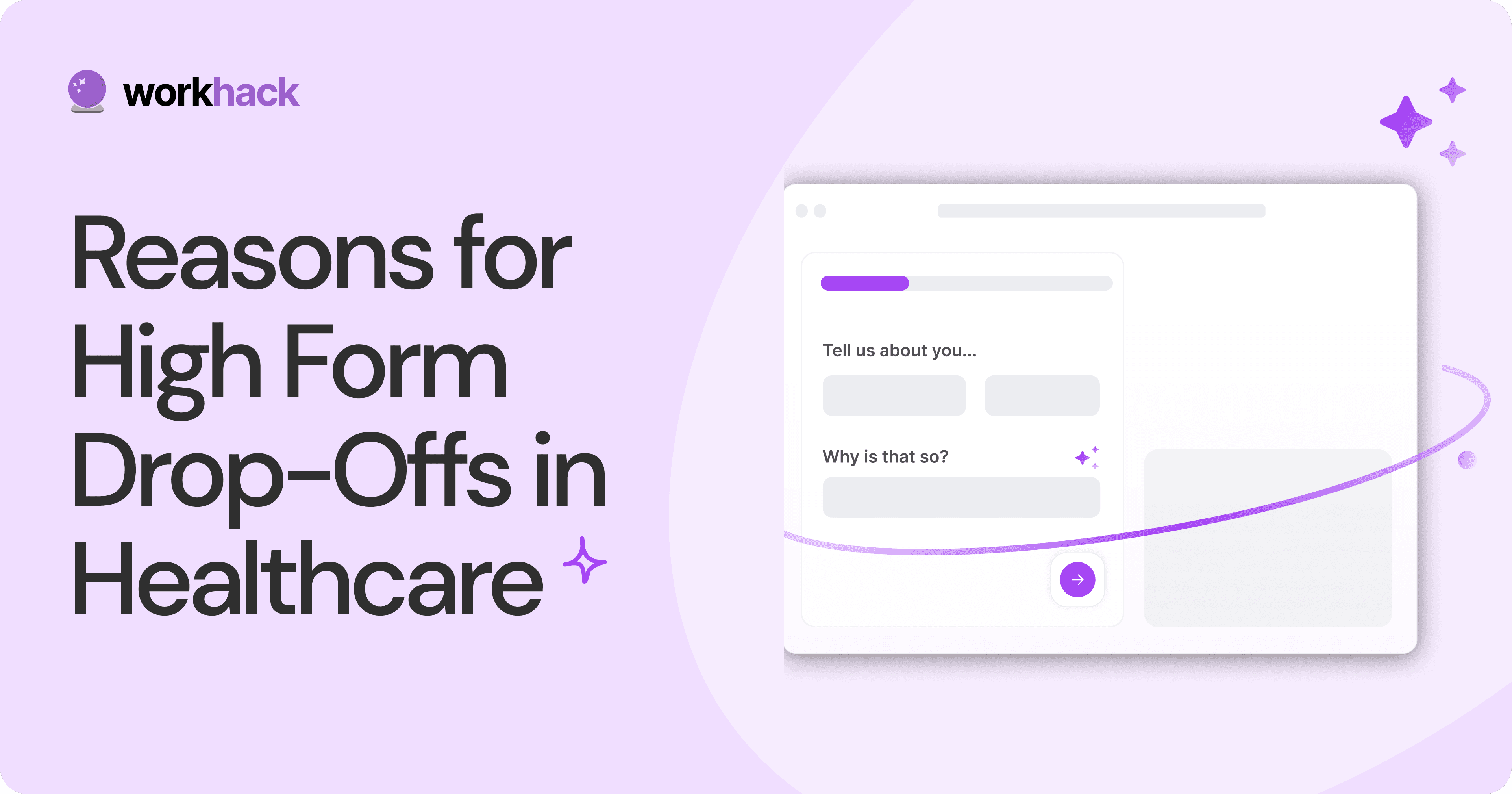
3 Reasons for Major Drop-Offs in Medical Forms.
No matter which healthcare form we pick, there are major drop-off reasons. We shall dive into the top 3 and learn how to resolve them in your next form.
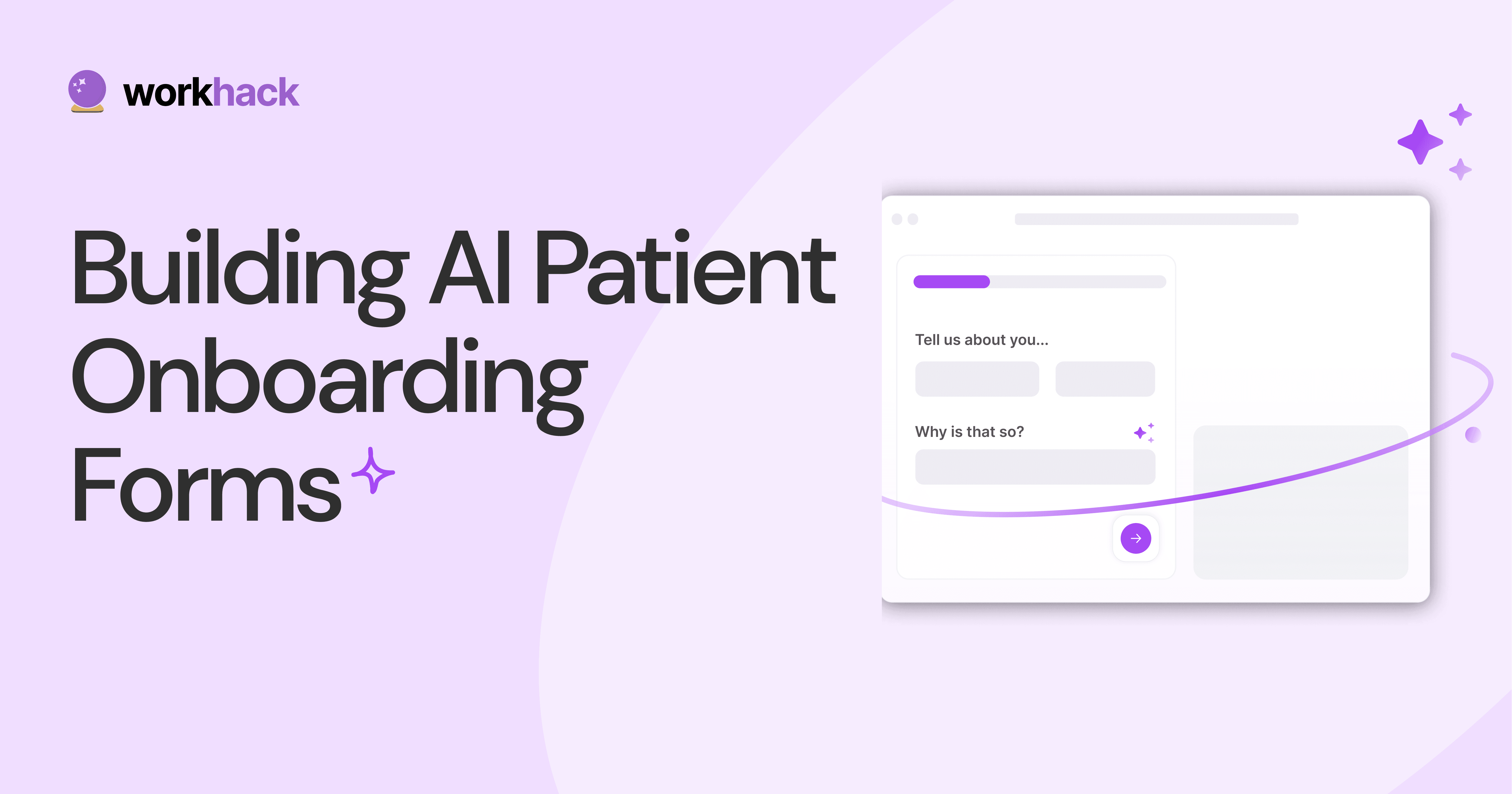
Patient Onboarding Forms - From Click to Clinic.
Patient onboarding forms are the first touchpoint for patients; getting this right for higher conversion rates is a must-have. Learn how to perfect them now.
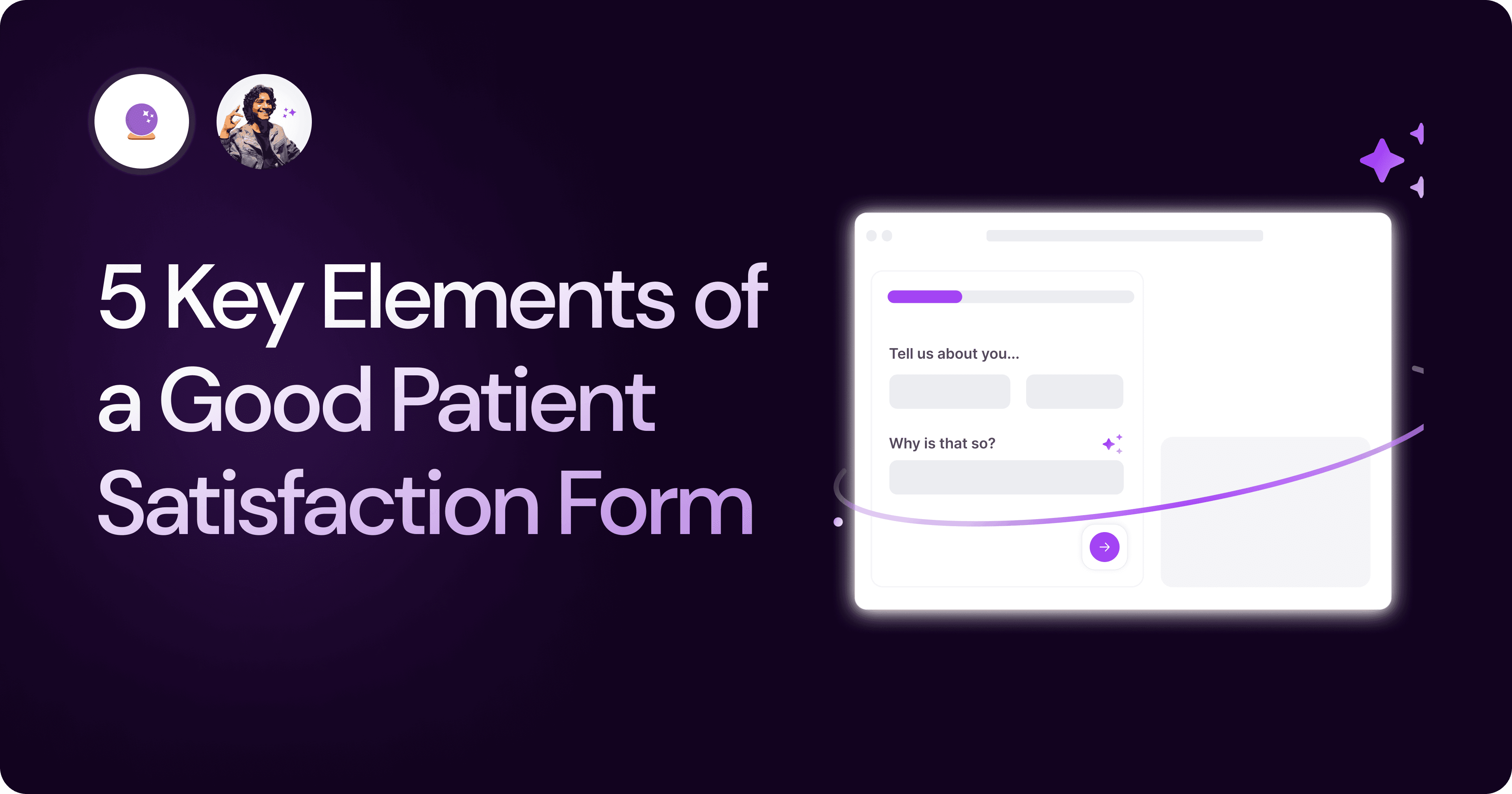
5 Key Parts of a Good Patient Satisfaction Form.
The goal of patient satisfaction surveys is to course-correct the services of a healthcare provider. Patient feedback leads to a culture of patient-centric care.
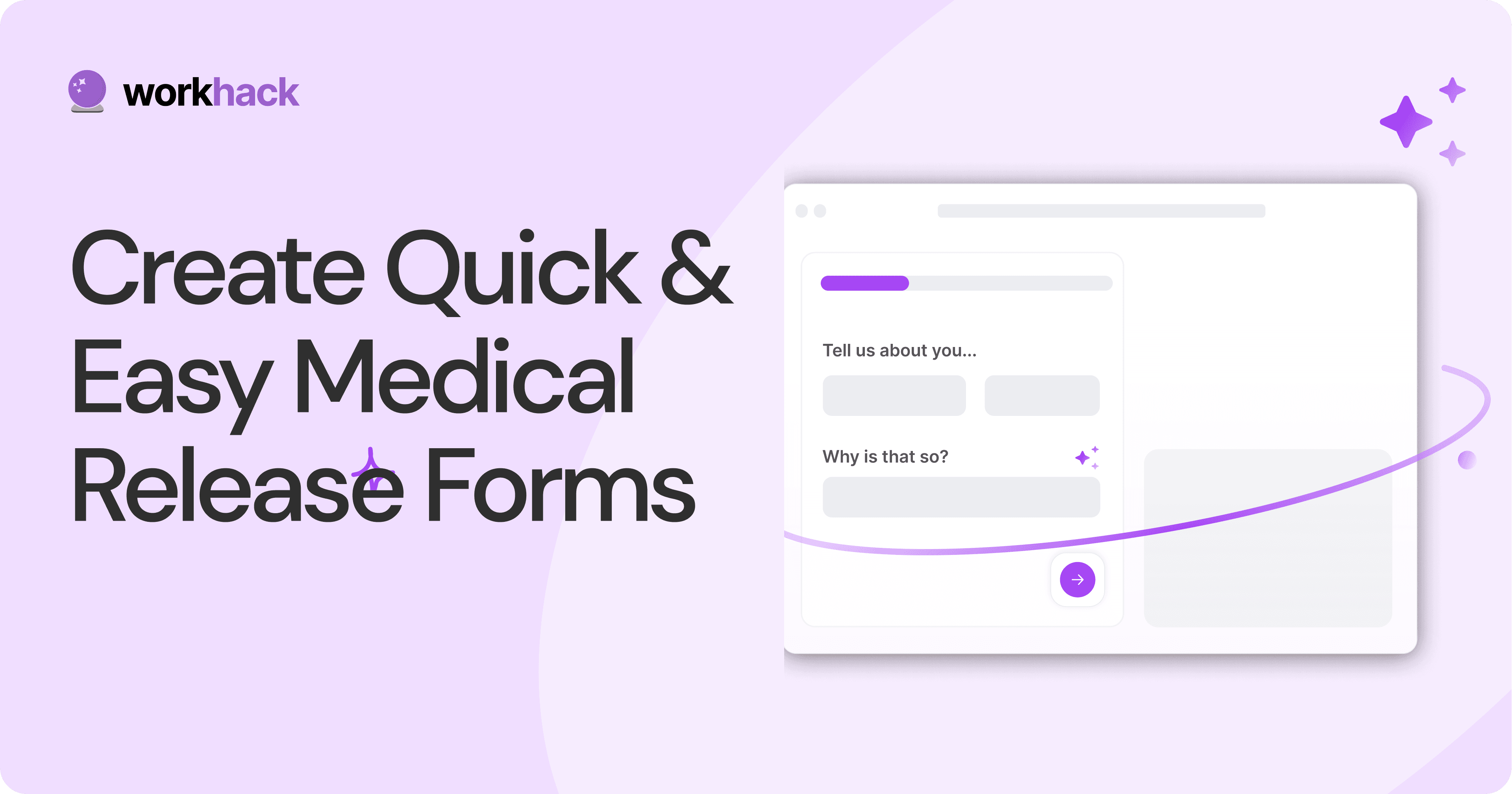
Build Quick and Easy Medical Release Forms.
Every HIPAA-compliant healthcare provider comes across medical release forms that involve details from medical history forms. Can they be shipped fast? Yes.

Nine Types of Healthcare and Medical Forms.
Medical forms are a must-have for any healthcare business or practitioner. Learn about the different kinds of medical and healthcare forms.

4 Tips for Better Medical History Forms.
Medical history forms are central to patient care, onboarding, and medical administration records. Learn how to make them easier to fill.

How to Build Mental Health Intake Forms?
Mental health intake forms are not like patient intake forms. Mental health intake forms deal with far more sensitive data and have specific design methods.

What, Why and How of Telemedicine Forms.
Telemedicine is on the rise and with different form builders out there, which one best suits your needs as a healthcare services provider?

3 Reasons for Major Drop-Offs in Medical Forms.
No matter which healthcare form we pick, there are major drop-off reasons. We shall dive into the top 3 and learn how to resolve them in your next form.

Patient Onboarding Forms - From Click to Clinic.
Patient onboarding forms are the first touchpoint for patients; getting this right for higher conversion rates is a must-have. Learn how to perfect them now.

5 Key Parts of a Good Patient Satisfaction Form.
The goal of patient satisfaction surveys is to course-correct the services of a healthcare provider. Patient feedback leads to a culture of patient-centric care.

Build Quick and Easy Medical Release Forms.
Every HIPAA-compliant healthcare provider comes across medical release forms that involve details from medical history forms. Can they be shipped fast? Yes.

Nine Types of Healthcare and Medical Forms.
Medical forms are a must-have for any healthcare business or practitioner. Learn about the different kinds of medical and healthcare forms.

4 Tips for Better Medical History Forms.
Medical history forms are central to patient care, onboarding, and medical administration records. Learn how to make them easier to fill.

How to Build Mental Health Intake Forms?
Mental health intake forms are not like patient intake forms. Mental health intake forms deal with far more sensitive data and have specific design methods.

What, Why and How of Telemedicine Forms.
Telemedicine is on the rise and with different form builders out there, which one best suits your needs as a healthcare services provider?

3 Reasons for Major Drop-Offs in Medical Forms.
No matter which healthcare form we pick, there are major drop-off reasons. We shall dive into the top 3 and learn how to resolve them in your next form.

Patient Onboarding Forms - From Click to Clinic.
Patient onboarding forms are the first touchpoint for patients; getting this right for higher conversion rates is a must-have. Learn how to perfect them now.

5 Key Parts of a Good Patient Satisfaction Form.
The goal of patient satisfaction surveys is to course-correct the services of a healthcare provider. Patient feedback leads to a culture of patient-centric care.

Build Quick and Easy Medical Release Forms.
Every HIPAA-compliant healthcare provider comes across medical release forms that involve details from medical history forms. Can they be shipped fast? Yes.

Nine Types of Healthcare and Medical Forms.
Medical forms are a must-have for any healthcare business or practitioner. Learn about the different kinds of medical and healthcare forms.

4 Tips for Better Medical History Forms.
Medical history forms are central to patient care, onboarding, and medical administration records. Learn how to make them easier to fill.

How to Build Mental Health Intake Forms?
Mental health intake forms are not like patient intake forms. Mental health intake forms deal with far more sensitive data and have specific design methods.

What, Why and How of Telemedicine Forms.
Telemedicine is on the rise and with different form builders out there, which one best suits your needs as a healthcare services provider?

3 Reasons for Major Drop-Offs in Medical Forms.
No matter which healthcare form we pick, there are major drop-off reasons. We shall dive into the top 3 and learn how to resolve them in your next form.

Patient Onboarding Forms - From Click to Clinic.
Patient onboarding forms are the first touchpoint for patients; getting this right for higher conversion rates is a must-have. Learn how to perfect them now.

5 Key Parts of a Good Patient Satisfaction Form.
The goal of patient satisfaction surveys is to course-correct the services of a healthcare provider. Patient feedback leads to a culture of patient-centric care.

Build Quick and Easy Medical Release Forms.
Every HIPAA-compliant healthcare provider comes across medical release forms that involve details from medical history forms. Can they be shipped fast? Yes.
Subscribe to stay updated.
Subscribe to stay updated.
Subscribe to stay updated.
HC

HC

HC

HC

70+ people from across industries read our emails.
HC

HC

70+ people from across industries read our emails.
HC

HC

HC

70+ people from across industries read our emails.




Bangalore, India / San Francisco, US
WorkHack Inc. 2023
Bangalore, India
San Francisco, US
WorkHack Inc. 2023
WorkHack Inc. 2023
Bangalore, India / San Francisco, US
WorkHack Inc. 2023
Bangalore, India / San Francisco, US



